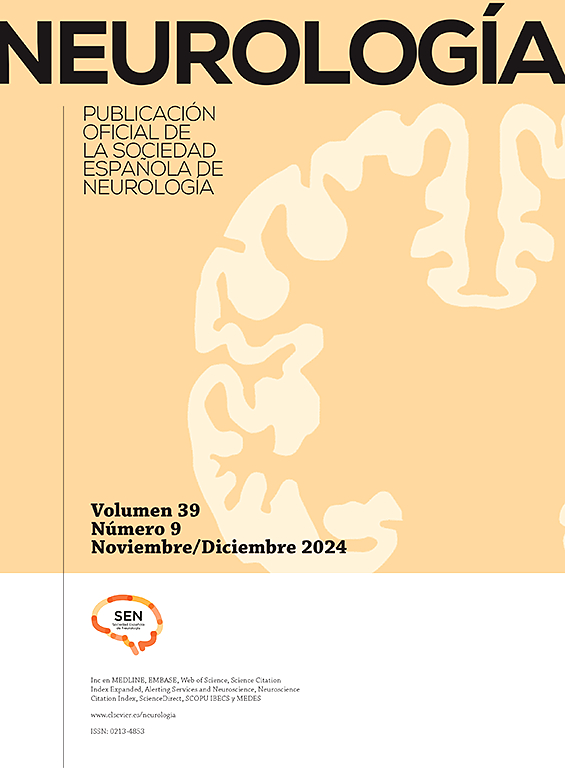Desarrollo y validación concurrente de un instrumento retrogenético para la valoración de las actividades de la vida diaria: la Escala de Evaluación Funcional del Test Barcelona
IF 3.1
4区 医学
Q2 CLINICAL NEUROLOGY
引用次数: 0
Abstract
Introduction
The assessment of activities of daily living (ADL) is considered essential in the evaluation of mild cognitive impairment (MCI), dementia and for its correct differential diagnosis. There are many scales for the functional assessment of these entities, although they are not exempt from drawbacks. The Barcelona Test ADL scale was published in 2019 with the aim of having a retrogenetic instrument that could overcome most of the problems encountered by its predecessors.
Method
A study was carried out to evaluate the properties of this scale. A total sample of 68 subjects (healthy controls, patients with amnestic-type MCI, and patients with Alzheimer's-type dementia) stratified according to the Global Cognitive Impairment Scale -Global Deterioration Scale- completed with the Functional Assessment Staging- Scale (GDS-FAST). The scores of each group on the scale, as well as on other cognitive tests, were studied to obtain the descriptive and internal consistency, concurrent validity, and discriminative capacity indices.
Results
The scale means differed significantly between all stratification groups. A high internal consistency index was obtained (Cronbach's α 0.975), excellent concurrent validity (Spearman's ρ of 0.95) and very good discriminative capacity, especially between the GDS-FAST 3 and 4 groups, and the GDS-FAST 4 and 5 groups.
Conclusions
The Barcelona Test ADL scale allows adequately evaluating the retrogenetic functional level of patients and discriminating between the different phases of the GDS-FAST, positioning itself as a very complete and useful scale in our sociocultural environment.
开发并同时验证一种用于评估日常生活活动的逆转录遗传工具:巴塞罗那测试功能评估量表
日常生活活动(ADL)的评估被认为是评估轻度认知障碍(MCI),痴呆及其正确鉴别诊断的必要条件。这些实体的功能评估有许多尺度,尽管它们也有缺点。巴塞罗那测试ADL量表于2019年发布,目的是拥有一种可以克服其前身遇到的大部分问题的逆向工具。方法对该量表进行性能评价。共有68名受试者(健康对照、遗忘型轻度认知损伤患者和阿尔茨海默氏型痴呆患者)根据全球认知障碍量表-全球恶化量表进行分层,并完成功能评估分期量表(GDS-FAST)。研究各组在量表以及其他认知测试上的得分,以获得描述性和内部一致性、并发效度和判别能力指标。结果各分层组间量表均数差异有统计学意义。内部一致性指数高(Cronbach’s α 0.975),并发效度好(Spearman’s ρ为0.95),区分能力好,特别是GDS-FAST 3、4组和GDS-FAST 4、5组之间。结论:巴塞罗那测试ADL量表可以充分评估患者的逆行功能水平,并区分GDS-FAST的不同阶段,在我们的社会文化环境中,它将自己定位为一个非常完整和有用的量表。
本文章由计算机程序翻译,如有差异,请以英文原文为准。
求助全文
约1分钟内获得全文
求助全文
来源期刊

Neurologia
医学-临床神经学
CiteScore
5.90
自引率
2.60%
发文量
135
审稿时长
48 days
期刊介绍:
Neurología es la revista oficial de la Sociedad Española de Neurología y publica, desde 1986 contribuciones científicas en el campo de la neurología clínica y experimental. Los contenidos de Neurología abarcan desde la neuroepidemiología, la clínica neurológica, la gestión y asistencia neurológica y la terapéutica, a la investigación básica en neurociencias aplicada a la neurología. Las áreas temáticas de la revistas incluyen la neurologia infantil, la neuropsicología, la neurorehabilitación y la neurogeriatría. Los artículos publicados en Neurología siguen un proceso de revisión por doble ciego a fin de que los trabajos sean seleccionados atendiendo a su calidad, originalidad e interés y así estén sometidos a un proceso de mejora. El formato de artículos incluye Editoriales, Originales, Revisiones y Cartas al Editor, Neurología es el vehículo de información científica de reconocida calidad en profesionales interesados en la neurología que utilizan el español, como demuestra su inclusión en los más prestigiosos y selectivos índices bibliográficos del mundo.
 求助内容:
求助内容: 应助结果提醒方式:
应助结果提醒方式:


